Accueil »
Accueil
Politique de confidentialité des plateformes digitales de la FMH
INTRODUCTION
Merci de visiter nos sites Web et Plateformes et de prendre connaissance de notre Politique de confidentialité, ainsi que de nos pratiques relatives aux renseignements personnels et au respect de la vie privée.
La Fédération mondiale de l'hémophilie (ci-après « la FMH » ou « FMH ») reconnaît que la protection de la vie privée est l’affaire de tous, et prend très au sérieux la confidentialité et la sécurité de vos renseignements personnels. Pour cette raison, nous avons pris des mesures pour nous assurer que tous les renseignements personnels que nous recueillons à votre sujet soient protégés par une gamme de procédures et de mesures de sécurité rigoureuses afin de s’assurer que vos renseignements demeurent confidentiels et ne soient utilisés qu’aux fins convenues dans la présente politique, sauf si la loi l’autorise autrement.
La FMH s’engage à protéger le droit à la vie privée de toutes les personnes au sujet desquelles elle a recueilli des renseignements personnels. À cette fin, la présente politique vise à établir des pratiques responsables et transparentes pour la gestion des renseignements personnels et à satisfaire aux exigences des règles établies notamment par la Loi sur la protection des renseignements personnels dans le secteur privé (« LPRPSP », RLRQ c. P -39.1) et la Loi sur la protection des renseignements personnels et les documents électroniques (« LPRPDÉ », L.C. 2000, ch. 5) (ci-après les « Lois »). La FMH est également assujettie aux dispositions européennes du Règlement Général sur la Protection des Données (« RGDP »).
1. |
OBJECTIF |
|---|---|
| 1.1 | La présente Politique de confidentialité des plateformes digitales de la FMH (ci-après « Politique » ou « Politique de confidentialité » explique non seulement comment nous recueillons, utilisons, divulguons et conservons toute information liée à vos données personnelles lorsque vous visitez tout site Web (ou « sites Web ») ou applications mobiles (« Applications » ou « Platformes ») exploités par la FMH, mais aussi comment vous pouvez accéder à vos renseignements personnels, les mettre à jour ou en prendre le contrôle. |
| 1.2 | La présente Politique remplace et est une mise à jour de la Politique de confidentialité du site web de la FMH (IT 003). |
2. |
PORTÉE |
|---|---|
| 2.1 | La présente Politique s’applique de manière générale :
|
| 2.2 | Liens externes. Cette politique ne s’applique pas aux liens vers des sites Web tiers, des plug-ins, des services, des réseaux sociaux ou des applications, notamment ceux qui sont proposés par l’intermédiaire d’hyperliens affichés sur nos sites Web et/ou Plateformes. Si vous suivez un lien vers un site Web tiers ou utilisez un plug-in tiers, veuillez noter que ces tiers ont leurs propres politiques de confidentialité et nous ne prenons aucune responsabilité pour ces politiques. Nous ne contrôlons pas ces sites Web tiers et nous vous encourageons à lire la politique de confidentialité de chaque site que vous visitez avant de leur fournir des renseignements personnels. |
3. |
DÉFINITION DE « RENSEIGNEMENTS PERSONNELS » |
|---|---|
| 3.1 | Lorsqu’utilisé dans la présente Politique, le terme « Renseignements personnels » désigne tout renseignement concernant une personne permettant de l’identifier. Ceci inclut, entre autres, votre nom, adresse, adresse courriel, numéro de téléphone, genre, renseignements bancaires, renseignements quant à votre emploi, votre santé ou autre. |
4. |
RESPONSABILITÉS DE LA FMH |
|---|---|
| 4.1 | La FMH s’engage à s’acquitter de toutes les exigences relatives à la protection, à la collecte, à l’utilisation, à la divulgation et à la conservation des renseignements personnels en vertu des Lois et toutes autres lois ou règlements applicables. Nous accordons une grande importance à la bonne gestion de vos données et assumons pleinement la responsabilité de celles-ci. |
| 4.2 | La FMH s’assurera également de mettre en place des mesures de sécurité raisonnables pour protéger et respecter la confidentialité de tout renseignement personnel sous sa garde et son contrôle. |
5. |
COMMENT NOUS RECUEILLONS VOTRE CONSENTEMENT ? |
|---|---|
| 5.1 | La FMH considère que votre consentement à la cueillette, à l’utilisation ou à la divulgation de vos renseignements personnels sera valablement fourni : i) s’il est donné expressément par votre acquiescement écrit ou oral; ii) si vous fournissez volontairement des renseignements personnels dans un but évident; ou iii) si vous ne vous opposez pas à la collecte, à l’utilisation ou à la divulgation de renseignements personnels par la FMH dans un délai raisonnable après que la FMH vous a clairement informé, incluant par l’entremise de la présente Politique, de son intention de le faire et des fins poursuivies. |
| 5.2 | Dans certains cas, la FMH peut recueillir des renseignements personnels sur une personne sans son consentement, conformément aux Lois ou toute autre loi ou règlement le permettant. |
6. |
POURQUOI NOUS RECUEILLONS DES RENSEIGNEMENTS PERSONNELS |
|---|---|
| 6.1 | Nous croyons fermement qu'il est important de minimiser les renseignements que nous recueillons et de limiter leur utilisation et leur finalité. La FMH n’utilise vos renseignements personnels qu’aux fins et pour la durée requise pour lesquels ils ont été recueillis, ou pour toute utilisation qui peut être requise ou autorisée pour des raisons de conformité légale, de demande gouvernementale, d'ordonnance d'un tribunal ou d'autres fins légales. |
| 6.2 | Nous recueillons des renseignements personnels pour diverses raisons. En général, la FMH ne recueille que les renseignements personnels nécessaires à la réalisation de sa mission. Il se peut également que nous recueillions de l’information à des fins administratives — pour mieux comprendre les visiteurs qui viennent sur nos sites Web et/ou Plateformes et le contenu de nos sites Web et/ou Plateformes qui les intéresse. Les objectifs pour lesquels nous recueillons des renseignements personnels incluent, mais ne sont pas limités à:
|
| 6.3 | Dans la mesure du possible, plutôt que d’utiliser des renseignements personnels, nous anonymiserons et/ou agrégerons les renseignements personnels afin qu’ils n’identifient plus une personne et les utiliserons aux fins mentionnées ci-dessus ou pour toute fin permise par la loi. |
| 6.4 | Si jamais nous désirons utiliser ou divulguer vos renseignements personnels à des fins autres que celles spécifiquement décrites dans la présente Politique, nous nous engageons à obtenir votre consentement. |
7. |
QUELS RENSEIGNEMENTS PERSONNELS RECUEILLONS-NOUS ? |
|---|---|
| 7.1 | La FMH ne recueille que des renseignements personnels qui sont liés directement à un de nos programmes ou à une de nos activités. Nous prenons des mesures pour nous assurer que les renseignements personnels que nous recueillons à votre sujet sont adéquats, pertinents, non excessifs et utilisés à des fins limitées. Nous recueillons seulement les renseignements dont nous avons besoin. |
| 7.2 | La FMH recueille des renseignements sur ses sites Web et/ou Plateformes de deux façons : |
| 7.2.1 | Les renseignements que vous nous fournissez directement : Dans de nombreux cas, nous recueillons des renseignements personnels directement auprès de vous lorsque vous fournissez vos informations en vous inscrivant à notre bulletin d’information (Newsletter), lorsque vous remplissez d’autres formulaires sur nos sites Web et/ou Plateformes, lorsque vous faites une demande ou lorsque vous nous contactez en personne ou par le biais des sites Web et/ou Plateformes de la FMH. La communication de ces renseignements est strictement volontaire. Nous vous encourageons fortement à ne pas fournir d’information au-delà de ce qui est nécessaire. |
| 7.2.2 | Les renseignements recueillis automatiquement : Vous devez savoir que, lorsque vous accédez ou naviguez dans nos sites Web et/ou Plateformes, un échange d’informations s’effectue automatiquement, sous réserve de votre consentement préalable, entre votre appareil et l’environnement d’hébergement de la FMH. Cet échange n'est requis qu'en raison des exigences technologiques inhérentes à la navigation dans Internet et est utilisé à des fins statistiques en vue d’améliorer votre expérience — l’information échangée ne vous identifie pas personnellement. L'information échangée est:
|
| 7.3 | À travers votre utilisation des sites Web et/ou Plateformes de la FMH, vous consentez aux termes et conditions énoncées dans la présente Politique de confidentialité. |
8. |
UTILISATION DE TÉMOINS DE CONNEXION (« COOKIES ») |
|---|---|
| 8.1 | Les principaux types de données recueillies sur les sites Web et/ou Plateformes de la FMH sont des témoins (aussi appelés « cookies ») et des paramètres de personnalisation. Les témoins sont de petits fichiers textes qui sont téléchargés lorsque vous consultez certaines pages d’un site et qui sont enregistrés dans la mémoire de l’appareil que vous utilisez. Ces fichiers sont complètement inoffensifs et ne peuvent contenir de virus. Ils permettent d’enregistrer certaines informations (type de navigateur, langue, pays, identifiant, etc.) afin d’être récupérées par le serveur lors de visites subséquentes. En aucun cas, les fichiers témoins ne permettent d’identifier le visiteur. Les données restent complètement anonymes et les témoins n’ont pour but que de faciliter la navigation et d’améliorer les sites Web et/ou Plateformes de la FMH en fonction des besoins de ses visiteurs. |
| 8.2 | Si vous ne souhaitez pas que des témoins soient utilisés, les options de votre navigateur peuvent être configurées pour refuser les témoins et/ou les supprimer. Il est à noter que la désactivation ou la suppression des témoins risque de vous priver de certaines fonctions offertes sur nos sites Web et/ou Plateformes. De plus, cette procédure doit être répétée pour chacun des navigateurs et ordinateurs utilisés. |
| 8.3 | Google Analytics. Nous recueillons automatiquement de l’information sur les visites sur nos sites Web et/ou Plateformes pour nous aider à l’entretenir et à l’améliorer. Nous examinons également les statistiques de trafic Web, notamment les heures ou les jours où nous voyons une plus grande affluence, et nous évaluons la popularité relative de certaines sections nos sites Web et/ou Plateformes. Nous nous servons de Google Analytics pour recueillir ces données et les analyser. Google Analytics compile des renseignements sur la date et l’heure des visites sur nos sites Web et/ou Plateformes. Ce service peut également suivre les mouvements d’un visiteur sur les sites Web et/ou Plateformes, mais ne recueille aucun renseignement personnel. Vous pouvez installer le Module complémentaire de navigateur pour la désactivation de Google Analytics si vous ne souhaitez pas que des données sur vos visites sur nos sites Web et/ou Plateformes soient transmises à Google Analytics. À l’aide de notre logiciel de statistiques (Google Analytics), nous obtenons de l’information sur l’heure et la date des accès à nos sites Web et/ou Plateformes et nous pouvons étudier l’activité d’un utilisateur sur les sites Web et/ou Plateformes. Nous utilisons ces données pour améliorer le rendement des sites Web et/ou Plateformes. |
| 8.4 | Pixel Meta. La FMH peut aussi avoir recours à des pixels invisibles pour suivre l'activité des visiteurs sur nos sites Web et/ou Plateformes. Nous nous servons du Pixel Meta pour recueillir des données sur vos interactions avec nos sites Web et/ou Plateformes, telles que les pages visitées, les actions prises, les boutons sur lesquels les visiteurs du site cliquent et toutes les pages consultées à la suite de ces clics. Les pixels invisibles ne contiennent aucun renseignement personnel mais peuvent contenir un identifiant unique nécessaire au reciblage et à la publicité ciblée. Le Pixel Meta nous permet de mesurer l'efficacité de notre publicité en comprenant les actions que vous effectuez sur nos sites Web et/ou Plateformes. Nous utilisons ces données uniquement à des fins d'analyse afin d'améliorer nos services et de fournir un contenu plus pertinent. |
9. |
RÉPONSE AUX OFFRES D’EMPLOI |
|---|---|
| 9.1 | Si vous avez postulé pour un emploi au sein de la FMH, nous utiliserons vos renseignements personnels à des fins de recrutement et à d’autres fins relatives aux ressources humaines. Nous conservons les documents envoyés (CV, lettre de présentation, etc) par les candidats jusqu’à un maximum de trois (3) ans. Les documents sont détruits de façon sécuritaire par la suite. |
10. |
PROTECTION DE LA VIE PRIVÉE DES MINEURS |
|---|---|
| 10.1 | La FMH ne recueille pas sciemment des renseignements personnels d’enfants âgés de moins de 14 ans sans le consentement du parent ou tuteur légal de ceux-ci. Si nous apprenons que nous avons recueilli ou reçu des renseignements personnels d’un enfant pour lequel une confirmation parentale était requise, nous supprimerons ces renseignements. Si vous croyez que nous pourrions avoir reçu des renseignements de la part d’un enfant ou au sujet d’un enfant pour lequel nous aurions dû obtenir le consentement parental, veuillez communiquer avec nous. |
11. |
DIVULGUONS-NOUS VOS RENSEIGNEMENTS PERSONNELS À DES TIERS ? |
|---|---|
| 11.1 | Soyez rassurés qu’en aucun cas la FMH ne vendra, n’échangera, ne louera, ne partagera ni ne transfèrera vos renseignements personnels à des tiers (organismes ou simples personnes) à des fins commerciales sans votre consentement, sauf dans les cas exceptionnels spécifiquement prévus par la présente Politique. |
| 11.2 | Dans le cadre de services offerts par nos fournisseurs externes. Il peut arriver que la FMH transfère les renseignements personnels que nous collectons ou que vous fournissez comme décrit dans la Politique à des fournisseurs de services et d’autres tiers que nous utilisons pour soutenir notre organisation. Ces tiers sont contractuellement obligés de garder les renseignements personnels confidentiels, de les utiliser uniquement aux fins pour lesquelles nous les divulguons et de traiter les renseignements personnels selon les normes énoncées dans la présente Politique et en respect des Lois. |
| 11.3 | Dans le contexte d’une obligation légale. La FMH peut divulguer vos renseignements personnels pour se conformer à toute ordonnance du tribunal, loi ou procédure judiciaire, y compris pour répondre à toute demande gouvernementale ou réglementaire, conformément aux lois applicables, pour lutter contre la fraude ou les atteintes portées à la FMH ou à nos membres, ou si nous croyons que la divulgation est nécessaire ou appropriée pour protéger les droits, la propriété ou la sécurité de la FMH ou d’autres personnes. |
12. |
PARTAGE ET TRANSFERT DE RENSEIGNEMENTS PERSONNELS À L’EXTÉRIEUR DU QUÉBEC |
|---|---|
| 12.1 | Vos renseignements personnels sont traités et stockés au Québec. Afin d’assurer la réalisation de notre mission, nous pouvons dans certains cas stocker, traiter et transférer vos renseignements un peu partout dans le monde, y compris à l’extérieur du Québec ou en dehors de votre pays de résidence — si vous êtes situé dans l’Espace Économique Européen (EEE) ou en Suisse, veuillez consulter l’Annexe A « Conditions supplémentaires » qui s’appliquent à vous en plus des conditions principales de la présente Politique. Des données peuvent également être stockées localement sur les appareils que vous utilisez pour accéder aux sites Web et/ou Plateformes de la FMH. |
| 12.2 | Dans de tels cas, ce transfert n’aura lieu que s’il est évalué que le renseignement bénéficierait d’une protection adéquate, notamment en considérant la sensibilité du renseignement, la finalité de son utilisation, les mesures de protection dont le renseignement bénéficierait, et le régime juridique applicable dans l’État ou la province où ce renseignement serait communiqué. Le transfert sera également soumis aux ententes contractuelles appropriées afin d’assurer cette protection adéquate. |
13. |
COMMENT PROTÉGEONS-NOUS VOS RENSEIGNEMENTS PERSONNELS ? |
|---|---|
| 13.1 | La sécurité de vos renseignements personnels est très importante pour nous. Les renseignements personnels que nous collectons sont conservés dans un environnement sécurisé au moyen de technologies reconnues dans l’industrie. Nous protégerons les renseignements personnels contre la perte ou le vol, l’accès, l’utilisation ou la divulgation non autorisés, la reproduction, la modification ou la destruction. |
| 13.2 | Lorsque vous vous trouvez sur nos sites Web et/ou Plateformes et que l’on vous demande des renseignements personnels, ceux-ci sont utilisés exclusivement par la FMH. Afin de protéger vos renseignements personnels, nous avons mis en place les mesures de sécurité habituelles qui sont appropriées à la sensibilité des renseignements collectés, y compris les mesures physiques, organisationnelles, contractuelles et technologiques suivantes:
|
| 13.3 | Les personnes qui travaillent pour la FMH ou agissent en notre nom doivent faire des efforts raisonnables pour minimiser le risque de divulgation non intentionnelle de renseignements personnels. De plus, nos politiques, procédures et codes de conduite sont clairement communiqués auprès de nos employés, contractuels, bénévoles, consultants et sous-contractants et la FMH veillera à leur respect et adhésion. Toutes les personnes qui ne respecteront pas les principes et les procédures de la présente Politique feront l’objet de mesures correctives, y compris la terminaison de leur lien d’emploi ou la résiliation de leur mandat ou contrat. |
| 13.4 | Malgré ces mesures, aucune méthode de transmission ou de stockage n’est sûre à 100% ni à l’abri d’une erreur. Par conséquent, nous ne pouvons malheureusement pas garantir une sécurité absolue. Si vous avez des raisons de croire que votre interaction avec nous n’est plus sécurisée, veuillez nous contacter immédiatement. |
| 13.5 | Si nous avons connaissance d’une brèche de sécurité touchant vos renseignements personnels, nous vous en informerons et nous aviserons aussi les autorités compétentes dès que possible, conformément aux lois applicables. |
14. |
CONSERVATION ET DESTRUCTION DES RENSEIGNEMENTS PERSONNELS |
|---|---|
| 14.1 | Sauf autorisation ou exigence des Lois ou de la réglementation applicable, la FMH ne conservera vos renseignements personnels que le temps nécessaire pour atteindre les fins pour lesquelles nous les avons collectées, y compris aux fins de satisfaire aux exigences légales, comptables ou en matière d’avis aux instances gouvernementales et réglementaires appropriées. |
| 14.2 | Les renseignements personnels qui ne sont plus nécessaires pour les fins pour lesquelles ils ont été recueillis, seront détruits, effacés ou rendus anonymes conformément aux lois applicables. |
| 14.3 | Dans certaines circonstances, nous pouvons anonymiser vos renseignements personnels afin qu’ils ne puissent plus être associés à vous. Nous nous réservons le droit d’utiliser ces données anonymes et dépersonnalisées à des fins légitimes, sans autre préavis ni consentement de votre part. |
| 14.4 | Si la FMH utilise des renseignements personnels pour prendre une décision qui affecte directement une personne, nous conserverons ces renseignements pendant la durée nécessaire pour les fins pour lesquelles ils sont recueillis. Après les avoir utilisés, les personnes ont la possibilité d’y avoir accès selon les modalités prévues aux Lois. |
15. |
ACCÈS, CORRECTION, DÉSINDEXATION ET PORTABILITÉ DE VOS RENSEIGNEMENTS PERSONNELS |
|---|---|
| 15.1 | Il est important que les renseignements personnels que nous détenons à votre sujet soient exacts, complets et à jour. Veuillez nous tenir informés si vos renseignements personnels changent. Vous pouvez communiquer avec nous via le Formulaire de contact en ligne de la FMH ou nous contacter à [email protected]. |
| 15.2 | Toute personne est en droit, sur demande, d’être informée de l’existence, de l’utilisation et de la divulgation de ses renseignements personnels et d’obtenir l’accès à ses renseignements personnels ou d’obtenir copie de ses renseignements personnels dans un format électronique ou non, sous réserve d’un préavis approprié. Toute personne est en droit de contester l’exactitude et l’exhaustivité de ses renseignements personnels, de les faire modifier, ou de retirer son consentement à l’utilisation de ses renseignements. De plus, la FMH se conforme à toutes les lois concernant l’accès et la correction de vos renseignements personnels. |
| 15.3 | Toute personne est également en droit d’obtenir copie de ses renseignements personnels informatisés dans un format structuré, lisible par une machine et couramment utilisé. Dans certaines circonstances, la personne peut également nous demander de transférer directement ses renseignements personnels informatisés à des tiers. Toute personne est en droit de faire cesser la diffusion de ses renseignements personnels, ou de demander à ce que soit désindexé ou réindexé tout hyperlien rattaché à son nom permettant d’accéder à un renseignement personnel. |
| 15.4 | Une demande d’accès, de rectification, de désindexation ou de portabilité des données ne peut être considérée que si elle est faite par écrit et adressées au responsable de la protection des renseignements personnels de la FMH (ci-après « le RPRP de la FMH » ou « le RPRP »). La demande doit fournir suffisamment de détails pour permettre à la FMH de traiter la demande. Le RPRP répondra dans les 30 jours qui suivent la date de la réception d’une demande, à moins qu’il ne prolonge le délai autorisé par les Lois. |
16. |
RETRAIT DE VOTRE CONSENTEMENT |
|---|---|
| 16.1 | Lorsque vous avez donné votre consentement à la collecte, à l’utilisation et au transfert de vos renseignements personnels, vous pouvez avoir le droit légal de retirer votre consentement dans certaines circonstances. Pour retirer votre consentement, le cas échéant, contactez-nous à [email protected]. |
| 16.2 | Veuillez noter que si vous retirez votre consentement, il se peut que nous ne puissions pas vous fournir un service particulier. Nous vous expliquerons alors l’impact du retrait de votre consentement pour vous aider dans votre décision. |
17. |
MODIFICATION DE NOTRE POLITIQUE DE CONFIDENTIALITÉ |
|---|---|
| 17.1 | La FMH révisera et mettra à jour, à l’occasion, ses politiques et procédures afin de s’assurer de se conformer en tout temps aux règles, règlements et normes applicables et afin de tenir compte des nouvelles technologies. Notre Politique de confidentialité peut donc être modifiée de temps à autre. Nous afficherons tout changement à notre Politique sur nos sites Web et Plateformes, si les changements sont significatifs, nous publierons un avis plus visible à cet égard. Vous êtes responsable de vous assurer de visiter périodiquement nos sites Web et/ou Plateformes et la présente Politique pour vérifier tout changement. |
| 17.2 | Veuillez noter que les versions française et anglaise de notre Politique de confidentialité ont toutes deux la même valeur juridique. |
18. |
COORDONNÉES DU RESPONSABLE DE LA PROTECTION DES RENSEIGNEMENTS PERSONNELS (RPRP) |
|---|---|
| Pour tout commentaire, question ou demande concernant cette politique ou nos pratiques de confidentialité, ou rapporter des abus de la part de tiers, n'hésitez pas à communiquer avec Antonio José Almeida, Directeur senior, Opérations et responsable de la protection des renseignements personnels (RPRP) de la FMH par courriel à [email protected] ou à l'adresse postale suivante : | |
| a/s Responsable de la protection des renseignements personnels, Fédération mondiale de l’hémophilie 1184 rue Sainte-Catherine Ouest Bureau 500 Montréal, Québec H3B 1K1 Canada |
|
| Nous avons mis en place des procédures pour recevoir et répondre aux plaintes ou demandes de renseignements concernant notre traitement des renseignements personnels, notre conformité à cette Politique et aux lois applicables en matière de protection des renseignements personnels. Si vous n’êtes pas satisfaits de la façon dont la FMH a traité vos renseignements personnels, vous pouvez déposer une plainte auprès de la FMH. La plainte fera l’objet d’une enquête par le RPRP de la FMH, qui déterminera si le traitement des renseignements est conforme aux politiques et pratiques de la FMH et à toute autre loi applicable. Le RPRP fera tous les efforts raisonnables pour résoudre la plainte. La personne qui dépose la plainte sera informée de tout progrès ou résultat de l’enquête dans un maximum de 30 jours ouvrables suivant la réception de la demande et/ou du délai additionnel nécessaire pour terminer l’enquête. |
|
ANNEXE A |
|
|---|---|
| CONDITIONS SUPPLÉMENTAIRES POUR LES UTILISATEURS SITUÉS DANS L’ESPACE ÉCONOMIQUE EUROPÉEN (EEE) ET EN SUISSE | |
| Si vous êtes situé dans l’Espace Économique Européen (EEE) ou en Suisse, ces conditions supplémentaires s’appliquent à vous en plus des conditions principales de la Politique de confidentialité de la FMH. En cas de contradiction entre la Politique de confidentialité de la FMH et les présentes conditions supplémentaires, ces dernières prévaudront. | |
| 1 | BASES JURIDIQUES DU TRAITEMENT DES RENSEIGNEMENTS PERSONNELS EN VERTU DU RÈGLEMENT GÉNÉRAL SUR LA PROTECTION DES DONNÉES (RGPD) |
| 1.1 | Si vous êtes originaire de l’Espace Économique Européen (EEE) ou de la Suisse, la base juridique de la FMH pour la collecte et l'utilisation des renseignements personnels décrites dans la présente Politique de confidentialité dépend des données personnelles que nous collectons et du contexte spécifique dans lequel nous les collectons. Nous ne traitons vos renseignements personnels que si nous disposons d’une base juridique pour le faire, ce qui inclut :
|
Si vous avez des questions sur les bases juridiques sur lesquelles nous recueillons et utilisons vos données personnelles, veuillez contacter : Antonio José Almeida,Directeur senior, Opérations et responsable de la protection des renseignements personnels (RPRP) de la FMH par courriel à [email protected] ou à l'adresse postale suivante: a/s Responsable de la protection des renseignements personnels, Fédération mondiale de l’hémophilie, 1184 rue Sainte-Catherine Ouest, Bureau 500, Montréal, Québec, H3B 1K1, Canada |
|
| 2 | TRANSFERT DE VOS RENSEIGNEMENTS PERSONNELS EN DEHORS DE L’EEE OU DE LA SUISSE |
| 2.1 | Nous pouvons traiter des renseignements en dehors de l’EEE ou de la Suisse, y compris au Canada et aux États-Unis. |
| 3 | DROITS SUPPLÉMENTAIRES CONCERNANT VOS RENSEIGNEMENTS PERSONNELS EN VERTU DU RÈGLEMENT GÉNÉRAL SUR LA PROTECTION DES DONNÉES (RGPD) |
| 3.1 | Si vous résidez dans l'Espace Économique Européen (EEE) ou en Suisse, vous disposez de certains droits en matière de protection des renseignements personnels. La FMH vise à prendre des mesures raisonnables pour vous permettre de corriger, modifier, supprimer ou limiter l'utilisation de vos renseignements personnels. |
| 3.2 | Si vous souhaitez être informé des renseignements personnels que nous détenons à votre sujet et si vous souhaitez les supprimer de nos systèmes, veuillez nous contacter. |
| 3.3 | En plus des droits mentionnés à l’Article 15 (« Accès, correction, désindexation et portabilité de vos renseignements personnels ») et à l’Article 16 (« Retrait de votre consentement »), vous disposez également, dans certaines circonstances, des droits de protection des données suivants :
|
| 1.1 | La présente Politique de confidentialité des plateformes digitales de la FMH (ci-après « Politique » ou « Politique de confidentialité » explique non seulement comment nous recueillons, utilisons, divulguons et conservons toute information liée à vos données personnelles lorsque vous visitez tout site Web (ou « sites Web ») ou applications mobiles (« Applications » ou « Platformes ») exploités par la FMH, mais aussi comment vous pouvez accéder à vos renseignements personnels, les mettre à jour ou en prendre le contrôle. |
| 1.2 | La présente Politique remplace et est une mise à jour de la Politique de confidentialité du site web de la FMH (IT 003). |
| 2.1 | La présente Politique s’applique de manière générale :
|
| 2.2 | Liens externes. Cette politique ne s’applique pas aux liens vers des sites Web tiers, des plug-ins, des services, des réseaux sociaux ou des applications, notamment ceux qui sont proposés par l’intermédiaire d’hyperliens affichés sur nos sites Web et/ou Plateformes. Si vous suivez un lien vers un site Web tiers ou utilisez un plug-in tiers, veuillez noter que ces tiers ont leurs propres politiques de confidentialité et nous ne prenons aucune responsabilité pour ces politiques. Nous ne contrôlons pas ces sites Web tiers et nous vous encourageons à lire la politique de confidentialité de chaque site que vous visitez avant de leur fournir des renseignements personnels. |
| 3.1 | Lorsqu’utilisé dans la présente Politique, le terme « Renseignements personnels » désigne tout renseignement concernant une personne permettant de l’identifier. Ceci inclut, entre autres, votre nom, adresse, adresse courriel, numéro de téléphone, genre, renseignements bancaires, renseignements quant à votre emploi, votre santé ou autre. |
| 4.1 | La FMH s’engage à s’acquitter de toutes les exigences relatives à la protection, à la collecte, à l’utilisation, à la divulgation et à la conservation des renseignements personnels en vertu des Lois et toutes autres lois ou règlements applicables. Nous accordons une grande importance à la bonne gestion de vos données et assumons pleinement la responsabilité de celles-ci. |
| 4.2 | La FMH s’assurera également de mettre en place des mesures de sécurité raisonnables pour protéger et respecter la confidentialité de tout renseignement personnel sous sa garde et son contrôle. |
| 5.1 | La FMH considère que votre consentement à la cueillette, à l’utilisation ou à la divulgation de vos renseignements personnels sera valablement fourni : i) s’il est donné expressément par votre acquiescement écrit ou oral; ii) si vous fournissez volontairement des renseignements personnels dans un but évident; ou iii) si vous ne vous opposez pas à la collecte, à l’utilisation ou à la divulgation de renseignements personnels par la FMH dans un délai raisonnable après que la FMH vous a clairement informé, incluant par l’entremise de la présente Politique, de son intention de le faire et des fins poursuivies. |
| 5.2 | Dans certains cas, la FMH peut recueillir des renseignements personnels sur une personne sans son consentement, conformément aux Lois ou toute autre loi ou règlement le permettant. |
| 6.1 | Nous croyons fermement qu'il est important de minimiser les renseignements que nous recueillons et de limiter leur utilisation et leur finalité. La FMH n’utilise vos renseignements personnels qu’aux fins et pour la durée requise pour lesquels ils ont été recueillis, ou pour toute utilisation qui peut être requise ou autorisée pour des raisons de conformité légale, de demande gouvernementale, d'ordonnance d'un tribunal ou d'autres fins légales. |
| 6.2 | Nous recueillons des renseignements personnels pour diverses raisons. En général, la FMH ne recueille que les renseignements personnels nécessaires à la réalisation de sa mission. Il se peut également que nous recueillions de l’information à des fins administratives — pour mieux comprendre les visiteurs qui viennent sur nos sites Web et/ou Plateformes et le contenu de nos sites Web et/ou Plateformes qui les intéresse. Les objectifs pour lesquels nous recueillons des renseignements personnels incluent, mais ne sont pas limités à:
|
| 6.3 | Dans la mesure du possible, plutôt que d’utiliser des renseignements personnels, nous anonymiserons et/ou agrégerons les renseignements personnels afin qu’ils n’identifient plus une personne et les utiliserons aux fins mentionnées ci-dessus ou pour toute fin permise par la loi. |
| 6.4 | Si jamais nous désirons utiliser ou divulguer vos renseignements personnels à des fins autres que celles spécifiquement décrites dans la présente Politique, nous nous engageons à obtenir votre consentement. |
| 7.1 | La FMH ne recueille que des renseignements personnels qui sont liés directement à un de nos programmes ou à une de nos activités. Nous prenons des mesures pour nous assurer que les renseignements personnels que nous recueillons à votre sujet sont adéquats, pertinents, non excessifs et utilisés à des fins limitées. Nous recueillons seulement les renseignements dont nous avons besoin. |
| 7.2 | La FMH recueille des renseignements sur ses sites Web et/ou Plateformes de deux façons : |
| 7.2.1 | Les renseignements que vous nous fournissez directement : Dans de nombreux cas, nous recueillons des renseignements personnels directement auprès de vous lorsque vous fournissez vos informations en vous inscrivant à notre bulletin d’information (Newsletter), lorsque vous remplissez d’autres formulaires sur nos sites Web et/ou Plateformes, lorsque vous faites une demande ou lorsque vous nous contactez en personne ou par le biais des sites Web et/ou Plateformes de la FMH. La communication de ces renseignements est strictement volontaire. Nous vous encourageons fortement à ne pas fournir d’information au-delà de ce qui est nécessaire. |
| 7.2.2 | Les renseignements recueillis automatiquement : Vous devez savoir que, lorsque vous accédez ou naviguez dans nos sites Web et/ou Plateformes, un échange d’informations s’effectue automatiquement, sous réserve de votre consentement préalable, entre votre appareil et l’environnement d’hébergement de la FMH. Cet échange n'est requis qu'en raison des exigences technologiques inhérentes à la navigation dans Internet et est utilisé à des fins statistiques en vue d’améliorer votre expérience — l’information échangée ne vous identifie pas personnellement. L'information échangée est:
|
| 7.3 | À travers votre utilisation des sites Web et/ou Plateformes de la FMH, vous consentez aux termes et conditions énoncées dans la présente Politique de confidentialité. |
| 8.1 | Les principaux types de données recueillies sur les sites Web et/ou Plateformes de la FMH sont des témoins (aussi appelés « cookies ») et des paramètres de personnalisation. Les témoins sont de petits fichiers textes qui sont téléchargés lorsque vous consultez certaines pages d’un site et qui sont enregistrés dans la mémoire de l’appareil que vous utilisez. Ces fichiers sont complètement inoffensifs et ne peuvent contenir de virus. Ils permettent d’enregistrer certaines informations (type de navigateur, langue, pays, identifiant, etc.) afin d’être récupérées par le serveur lors de visites subséquentes. En aucun cas, les fichiers témoins ne permettent d’identifier le visiteur. Les données restent complètement anonymes et les témoins n’ont pour but que de faciliter la navigation et d’améliorer les sites Web et/ou Plateformes de la FMH en fonction des besoins de ses visiteurs. |
| 8.2 | Si vous ne souhaitez pas que des témoins soient utilisés, les options de votre navigateur peuvent être configurées pour refuser les témoins et/ou les supprimer. Il est à noter que la désactivation ou la suppression des témoins risque de vous priver de certaines fonctions offertes sur nos sites Web et/ou Plateformes. De plus, cette procédure doit être répétée pour chacun des navigateurs et ordinateurs utilisés. |
| 8.3 | Google Analytics. Nous recueillons automatiquement de l’information sur les visites sur nos sites Web et/ou Plateformes pour nous aider à l’entretenir et à l’améliorer. Nous examinons également les statistiques de trafic Web, notamment les heures ou les jours où nous voyons une plus grande affluence, et nous évaluons la popularité relative de certaines sections nos sites Web et/ou Plateformes. Nous nous servons de Google Analytics pour recueillir ces données et les analyser. Google Analytics compile des renseignements sur la date et l’heure des visites sur nos sites Web et/ou Plateformes. Ce service peut également suivre les mouvements d’un visiteur sur les sites Web et/ou Plateformes, mais ne recueille aucun renseignement personnel. Vous pouvez installer le Module complémentaire de navigateur pour la désactivation de Google Analytics si vous ne souhaitez pas que des données sur vos visites sur nos sites Web et/ou Plateformes soient transmises à Google Analytics. À l’aide de notre logiciel de statistiques (Google Analytics), nous obtenons de l’information sur l’heure et la date des accès à nos sites Web et/ou Plateformes et nous pouvons étudier l’activité d’un utilisateur sur les sites Web et/ou Plateformes. Nous utilisons ces données pour améliorer le rendement des sites Web et/ou Plateformes. |
| 8.4 | Pixel Meta. La FMH peut aussi avoir recours à des pixels invisibles pour suivre l'activité des visiteurs sur nos sites Web et/ou Plateformes. Nous nous servons du Pixel Meta pour recueillir des données sur vos interactions avec nos sites Web et/ou Plateformes, telles que les pages visitées, les actions prises, les boutons sur lesquels les visiteurs du site cliquent et toutes les pages consultées à la suite de ces clics. Les pixels invisibles ne contiennent aucun renseignement personnel mais peuvent contenir un identifiant unique nécessaire au reciblage et à la publicité ciblée. Le Pixel Meta nous permet de mesurer l'efficacité de notre publicité en comprenant les actions que vous effectuez sur nos sites Web et/ou Plateformes. Nous utilisons ces données uniquement à des fins d'analyse afin d'améliorer nos services et de fournir un contenu plus pertinent. |
| 9.1 | Si vous avez postulé pour un emploi au sein de la FMH, nous utiliserons vos renseignements personnels à des fins de recrutement et à d’autres fins relatives aux ressources humaines. Nous conservons les documents envoyés (CV, lettre de présentation, etc) par les candidats jusqu’à un maximum de trois (3) ans. Les documents sont détruits de façon sécuritaire par la suite. |
| 10.1 | La FMH ne recueille pas sciemment des renseignements personnels d’enfants âgés de moins de 14 ans sans le consentement du parent ou tuteur légal de ceux-ci. Si nous apprenons que nous avons recueilli ou reçu des renseignements personnels d’un enfant pour lequel une confirmation parentale était requise, nous supprimerons ces renseignements. Si vous croyez que nous pourrions avoir reçu des renseignements de la part d’un enfant ou au sujet d’un enfant pour lequel nous aurions dû obtenir le consentement parental, veuillez communiquer avec nous. |
| 11.1 | Soyez rassurés qu’en aucun cas la FMH ne vendra, n’échangera, ne louera, ne partagera ni ne transfèrera vos renseignements personnels à des tiers (organismes ou simples personnes) à des fins commerciales sans votre consentement, sauf dans les cas exceptionnels spécifiquement prévus par la présente Politique. |
| 11.2 | Dans le cadre de services offerts par nos fournisseurs externes. Il peut arriver que la FMH transfère les renseignements personnels que nous collectons ou que vous fournissez comme décrit dans la Politique à des fournisseurs de services et d’autres tiers que nous utilisons pour soutenir notre organisation. Ces tiers sont contractuellement obligés de garder les renseignements personnels confidentiels, de les utiliser uniquement aux fins pour lesquelles nous les divulguons et de traiter les renseignements personnels selon les normes énoncées dans la présente Politique et en respect des Lois. |
| 11.3 | Dans le contexte d’une obligation légale. La FMH peut divulguer vos renseignements personnels pour se conformer à toute ordonnance du tribunal, loi ou procédure judiciaire, y compris pour répondre à toute demande gouvernementale ou réglementaire, conformément aux lois applicables, pour lutter contre la fraude ou les atteintes portées à la FMH ou à nos membres, ou si nous croyons que la divulgation est nécessaire ou appropriée pour protéger les droits, la propriété ou la sécurité de la FMH ou d’autres personnes. |
| 12.1 | Vos renseignements personnels sont traités et stockés au Québec. Afin d’assurer la réalisation de notre mission, nous pouvons dans certains cas stocker, traiter et transférer vos renseignements un peu partout dans le monde, y compris à l’extérieur du Québec ou en dehors de votre pays de résidence — si vous êtes situé dans l’Espace Économique Européen (EEE) ou en Suisse, veuillez consulter l’Annexe A « Conditions supplémentaires » qui s’appliquent à vous en plus des conditions principales de la présente Politique. Des données peuvent également être stockées localement sur les appareils que vous utilisez pour accéder aux sites Web et/ou Plateformes de la FMH. |
| 12.2 | Dans de tels cas, ce transfert n’aura lieu que s’il est évalué que le renseignement bénéficierait d’une protection adéquate, notamment en considérant la sensibilité du renseignement, la finalité de son utilisation, les mesures de protection dont le renseignement bénéficierait, et le régime juridique applicable dans l’État ou la province où ce renseignement serait communiqué. Le transfert sera également soumis aux ententes contractuelles appropriées afin d’assurer cette protection adéquate. |
| 13.1 | La sécurité de vos renseignements personnels est très importante pour nous. Les renseignements personnels que nous collectons sont conservés dans un environnement sécurisé au moyen de technologies reconnues dans l’industrie. Nous protégerons les renseignements personnels contre la perte ou le vol, l’accès, l’utilisation ou la divulgation non autorisés, la reproduction, la modification ou la destruction. |
| 13.2 | Lorsque vous vous trouvez sur nos sites Web et/ou Plateformes et que l’on vous demande des renseignements personnels, ceux-ci sont utilisés exclusivement par la FMH. Afin de protéger vos renseignements personnels, nous avons mis en place les mesures de sécurité habituelles qui sont appropriées à la sensibilité des renseignements collectés, y compris les mesures physiques, organisationnelles, contractuelles et technologiques suivantes:
|
| 13.3 | Les personnes qui travaillent pour la FMH ou agissent en notre nom doivent faire des efforts raisonnables pour minimiser le risque de divulgation non intentionnelle de renseignements personnels. De plus, nos politiques, procédures et codes de conduite sont clairement communiqués auprès de nos employés, contractuels, bénévoles, consultants et sous-contractants et la FMH veillera à leur respect et adhésion. Toutes les personnes qui ne respecteront pas les principes et les procédures de la présente Politique feront l’objet de mesures correctives, y compris la terminaison de leur lien d’emploi ou la résiliation de leur mandat ou contrat. |
| 13.4 | Malgré ces mesures, aucune méthode de transmission ou de stockage n’est sûre à 100% ni à l’abri d’une erreur. Par conséquent, nous ne pouvons malheureusement pas garantir une sécurité absolue. Si vous avez des raisons de croire que votre interaction avec nous n’est plus sécurisée, veuillez nous contacter immédiatement. |
| 13.5 | Si nous avons connaissance d’une brèche de sécurité touchant vos renseignements personnels, nous vous en informerons et nous aviserons aussi les autorités compétentes dès que possible, conformément aux lois applicables. |
| 14.1 | Sauf autorisation ou exigence des Lois ou de la réglementation applicable, la FMH ne conservera vos renseignements personnels que le temps nécessaire pour atteindre les fins pour lesquelles nous les avons collectées, y compris aux fins de satisfaire aux exigences légales, comptables ou en matière d’avis aux instances gouvernementales et réglementaires appropriées. |
| 14.2 | Les renseignements personnels qui ne sont plus nécessaires pour les fins pour lesquelles ils ont été recueillis, seront détruits, effacés ou rendus anonymes conformément aux lois applicables. |
| 14.3 | Dans certaines circonstances, nous pouvons anonymiser vos renseignements personnels afin qu’ils ne puissent plus être associés à vous. Nous nous réservons le droit d’utiliser ces données anonymes et dépersonnalisées à des fins légitimes, sans autre préavis ni consentement de votre part. |
| 14.4 | Si la FMH utilise des renseignements personnels pour prendre une décision qui affecte directement une personne, nous conserverons ces renseignements pendant la durée nécessaire pour les fins pour lesquelles ils sont recueillis. Après les avoir utilisés, les personnes ont la possibilité d’y avoir accès selon les modalités prévues aux Lois. |
| 15.1 | Il est important que les renseignements personnels que nous détenons à votre sujet soient exacts, complets et à jour. Veuillez nous tenir informés si vos renseignements personnels changent. Vous pouvez communiquer avec nous via le Formulaire de contact en ligne de la FMH ou nous contacter à [email protected]. |
| 15.2 | Toute personne est en droit, sur demande, d’être informée de l’existence, de l’utilisation et de la divulgation de ses renseignements personnels et d’obtenir l’accès à ses renseignements personnels ou d’obtenir copie de ses renseignements personnels dans un format électronique ou non, sous réserve d’un préavis approprié. Toute personne est en droit de contester l’exactitude et l’exhaustivité de ses renseignements personnels, de les faire modifier, ou de retirer son consentement à l’utilisation de ses renseignements. De plus, la FMH se conforme à toutes les lois concernant l’accès et la correction de vos renseignements personnels. |
| 15.3 | Toute personne est également en droit d’obtenir copie de ses renseignements personnels informatisés dans un format structuré, lisible par une machine et couramment utilisé. Dans certaines circonstances, la personne peut également nous demander de transférer directement ses renseignements personnels informatisés à des tiers. Toute personne est en droit de faire cesser la diffusion de ses renseignements personnels, ou de demander à ce que soit désindexé ou réindexé tout hyperlien rattaché à son nom permettant d’accéder à un renseignement personnel. |
| 15.4 | Une demande d’accès, de rectification, de désindexation ou de portabilité des données ne peut être considérée que si elle est faite par écrit et adressées au responsable de la protection des renseignements personnels de la FMH (ci-après « le RPRP de la FMH » ou « le RPRP »). La demande doit fournir suffisamment de détails pour permettre à la FMH de traiter la demande. Le RPRP répondra dans les 30 jours qui suivent la date de la réception d’une demande, à moins qu’il ne prolonge le délai autorisé par les Lois. |
| 16.1 | Lorsque vous avez donné votre consentement à la collecte, à l’utilisation et au transfert de vos renseignements personnels, vous pouvez avoir le droit légal de retirer votre consentement dans certaines circonstances. Pour retirer votre consentement, le cas échéant, contactez-nous à [email protected]. |
| 16.2 | Veuillez noter que si vous retirez votre consentement, il se peut que nous ne puissions pas vous fournir un service particulier. Nous vous expliquerons alors l’impact du retrait de votre consentement pour vous aider dans votre décision. |
| 17.1 | La FMH révisera et mettra à jour, à l’occasion, ses politiques et procédures afin de s’assurer de se conformer en tout temps aux règles, règlements et normes applicables et afin de tenir compte des nouvelles technologies. Notre Politique de confidentialité peut donc être modifiée de temps à autre. Nous afficherons tout changement à notre Politique sur nos sites Web et Plateformes, si les changements sont significatifs, nous publierons un avis plus visible à cet égard. Vous êtes responsable de vous assurer de visiter périodiquement nos sites Web et/ou Plateformes et la présente Politique pour vérifier tout changement. |
| 17.2 | Veuillez noter que les versions française et anglaise de notre Politique de confidentialité ont toutes deux la même valeur juridique. |
| Pour tout commentaire, question ou demande concernant cette politique ou nos pratiques de confidentialité, ou rapporter des abus de la part de tiers, n'hésitez pas à communiquer avec Antonio José Almeida, Directeur senior, Opérations et responsable de la protection des renseignements personnels (RPRP) de la FMH par courriel à [email protected] ou à l'adresse postale suivante : | |
| a/s Responsable de la protection des renseignements personnels, Fédération mondiale de l’hémophilie 1184 rue Sainte-Catherine Ouest Bureau 500 Montréal, Québec H3B 1K1 Canada |
|
| Nous avons mis en place des procédures pour recevoir et répondre aux plaintes ou demandes de renseignements concernant notre traitement des renseignements personnels, notre conformité à cette Politique et aux lois applicables en matière de protection des renseignements personnels. Si vous n’êtes pas satisfaits de la façon dont la FMH a traité vos renseignements personnels, vous pouvez déposer une plainte auprès de la FMH. La plainte fera l’objet d’une enquête par le RPRP de la FMH, qui déterminera si le traitement des renseignements est conforme aux politiques et pratiques de la FMH et à toute autre loi applicable. Le RPRP fera tous les efforts raisonnables pour résoudre la plainte. La personne qui dépose la plainte sera informée de tout progrès ou résultat de l’enquête dans un maximum de 30 jours ouvrables suivant la réception de la demande et/ou du délai additionnel nécessaire pour terminer l’enquête. |
ANNEXE A |
|
|---|---|
| CONDITIONS SUPPLÉMENTAIRES POUR LES UTILISATEURS SITUÉS DANS L’ESPACE ÉCONOMIQUE EUROPÉEN (EEE) ET EN SUISSE | |
| Si vous êtes situé dans l’Espace Économique Européen (EEE) ou en Suisse, ces conditions supplémentaires s’appliquent à vous en plus des conditions principales de la Politique de confidentialité de la FMH. En cas de contradiction entre la Politique de confidentialité de la FMH et les présentes conditions supplémentaires, ces dernières prévaudront. | |
| 1 | BASES JURIDIQUES DU TRAITEMENT DES RENSEIGNEMENTS PERSONNELS EN VERTU DU RÈGLEMENT GÉNÉRAL SUR LA PROTECTION DES DONNÉES (RGPD) |
| 1.1 | Si vous êtes originaire de l’Espace Économique Européen (EEE) ou de la Suisse, la base juridique de la FMH pour la collecte et l'utilisation des renseignements personnels décrites dans la présente Politique de confidentialité dépend des données personnelles que nous collectons et du contexte spécifique dans lequel nous les collectons. Nous ne traitons vos renseignements personnels que si nous disposons d’une base juridique pour le faire, ce qui inclut :
|
Si vous avez des questions sur les bases juridiques sur lesquelles nous recueillons et utilisons vos données personnelles, veuillez contacter : Antonio José Almeida,Directeur senior, Opérations et responsable de la protection des renseignements personnels (RPRP) de la FMH par courriel à [email protected] ou à l'adresse postale suivante: a/s Responsable de la protection des renseignements personnels, Fédération mondiale de l’hémophilie, 1184 rue Sainte-Catherine Ouest, Bureau 500, Montréal, Québec, H3B 1K1, Canada |
|
| 2 | TRANSFERT DE VOS RENSEIGNEMENTS PERSONNELS EN DEHORS DE L’EEE OU DE LA SUISSE |
| 2.1 | Nous pouvons traiter des renseignements en dehors de l’EEE ou de la Suisse, y compris au Canada et aux États-Unis. |
| 3 | DROITS SUPPLÉMENTAIRES CONCERNANT VOS RENSEIGNEMENTS PERSONNELS EN VERTU DU RÈGLEMENT GÉNÉRAL SUR LA PROTECTION DES DONNÉES (RGPD) |
| 3.1 | Si vous résidez dans l'Espace Économique Européen (EEE) ou en Suisse, vous disposez de certains droits en matière de protection des renseignements personnels. La FMH vise à prendre des mesures raisonnables pour vous permettre de corriger, modifier, supprimer ou limiter l'utilisation de vos renseignements personnels. |
| 3.2 | Si vous souhaitez être informé des renseignements personnels que nous détenons à votre sujet et si vous souhaitez les supprimer de nos systèmes, veuillez nous contacter. |
| 3.3 | En plus des droits mentionnés à l’Article 15 (« Accès, correction, désindexation et portabilité de vos renseignements personnels ») et à l’Article 16 (« Retrait de votre consentement »), vous disposez également, dans certaines circonstances, des droits de protection des données suivants :
|
Cliquez ici pour télécharger la Politique de confidentialité des plateformes digitales de la FMH (PDF).
Date de révision : 27 novembre 2023
Modalités et conditions d’utilisation des plateformes digitales de la FMH
L’utilisation de tous les sites Web et Plateformes appartenant à la Fédération mondiale de l’hémophilie (FMH) est soumise aux modalités et conditions suivantes :
- En utilisant ces sites Web et/ou Plateformes, vous acceptez les modalités et conditions d’utilisation, et ce, à compter de la date à laquelle vous utilisez ces sites Web et/ou Plateformes pour la première fois.
- La Fédération mondiale de l’hémophilie se réserve le droit de modifier ces modalités et conditions d’utilisation à tout moment, en publiant un avis de modification en ligne. L’utilisation répétée de ce site suivant la publication des modifications constitue votre acceptation de ces modalités, telles que modifiées.
- Vous acceptez d’utiliser ces sites Web et/ou Plateformes à des fins légales, et d’une façon qui ne contrevient pas aux droits des tiers, ni ne restreint ou n’entrave leur jouissance d’utilisation relativement à ce site.
- Ces sites Web et/ou Plateformes et l’information qui s’y trouve, les noms, les images, les photographies, les logos concernant ou faisant référence à la Fédération mondiale de l’hémophilie sont fournis «tels quels», sans aucune représentation ou condition et ne constitue nullement une garantie expresse ou tacite. En aucun façon la Fédération mondiale de l’hémophilie ne sera tenue responsable de tous les dommages, incluant, mais sans s’y limiter, les dommages indirects, ou tout autre dommage découlant de l’usage de ce site ou y étant relié, ou de la perte d’usage de ces sites Web et/ou Plateformes, que ce soit par contrat ou par négligence.
- La Fédération mondiale de l’hémophilie ne garantit pas que les fonctionnalités contenues dans ces sites Web et/ou Plateformes ne seront pas interrompues ou exemptes d’erreurs, que les défaillances seront corrigées.
- La Fédération mondiale de l’hémophilie ne garantit pas que ces sites Web et/ou Plateformes ou le serveur soient exempts de virus ou bogues ou encore représentent le plein fonctionnement, la précision et l’exactitude du contenu.
- Restrictions relatives aux droits d’auteur :
- Toutes les informations, photographies, graphiques et autres documents sur ces sites Web et/ou Plateformes sont protégés par le droit d'auteur. Bien que les utilisateurs de ces sites Web et/ou Plateformes peuvent utiliser son contenu à des fins personnelles et non commerciales, aucun contenu des sites Web et/ou Plateformes ne peut être modifié, traduit, transféré ou vendu, copié, reproduit, publié ou distribué, en tout ou en partie, sans le consentement écrit préalable de la FMH.
- Malgré ce qui précède, certains documents et photos ont été publiés sur ces sites Web et/ou Plateformes avec le consentement des dits propriétaires de droits d’auteur (qui ne sont pas la Fédération mondiale de l’hémophilie). Tous les droits sont réservés sur ces documents et/ou photos et ne peuvent être reproduits sans obtenir le consentement des propriétaires de ces droits.
- La FMH encourage la diffusion de son information et accueille favorablement les propositions de réimpression, de redistribution et de traduction de ses documents. Si vous souhaitez publier de l’information que vous trouvez sur nos sites Web et/ou Plateformes, veuillez envoyer votre demande à [email protected].
- Le logo de la Fédération mondiale de l’hémophilie et ses éléments d'image graphique explicitement associés ne peuvent être reproduit à des fins commerciales ou promotionnelles sans une autorisation formelle de la Fédération mondiale de l’hémophilie.
- Si vous avez des questions concernant les pratiques de nos sites Web et/ou Plateformes ou des suggestions sur la façon de rendre ces sites Web et/ou Plateformes plus accessibles, veuillez nous contacter à [email protected].
La Fédération mondiale de l’hémophilie n’est pas responsable du contenu des sites Web externes qu’elle affiche. À travers nos sites Web et/ou Plateformes, nous fournissons des liens vers d'autres serveurs qui peuvent contenir des informations d'intérêt pour nos lecteurs. Nous n'assumons aucune responsabilité pour, et n'exerçons aucun contrôle sur, les organisations, les vues ou l'exactitude des informations contenues sur d'autres serveurs. Lorsque vous établissez un lien vers la FMH, nous vous demandons de vous assurer qu'il n'y a pas de connexions associées à des fins commerciales. Si vous avez un lien que vous voulez que nous ajoutions à notre site web, veuillez envoyer un courriel à [email protected] avec le sujet "Demande de lien".
Toute communication ou tout matériel qui sera transmis publiquement ou publié sur ces autres serveurs, incluant toute donnée, question, suggestion, tout commentaire et autre communication du même type seront traités comme non confidentiels et non exclusifs.
- La Fédération mondiale de l’hémophilie respecte le droit à la confidentialité de ses membres et des visiteurs sur ces sites Web et/ou Plateformes. À ce sujet, veuillez consulter notre Politique de confidentialité des plateformes digitales de la FMH.
- En cas de conflit entre les modalités et conditions d’utilisation des présentes et les directives ou modalités spécifiques d’utilisation apparaissant sur ces sites Web et/ou Plateformes et reliées à du matériel précis, ces dernières auront préséance.
- Ces modalités et conditions d’utilisation doivent être régies et interprétées selon les lois du Canada et du Québec. Tout litige devra être soumis à la juridiction exclusive des tribunaux du Canada et du Québec. Dans l’hypothèse où les modalités et conditions d’utilisation ne sont pas acceptées dans leur intégralité, l’usage de ces sites Web et/ou Plateformes doit cesser immédiatement.
Cliquez ici pour télécharger les Modalités et conditions d’utilisation des plateformes digitales de la FMH (PDF).
Date de révision : 15 septembre 2023

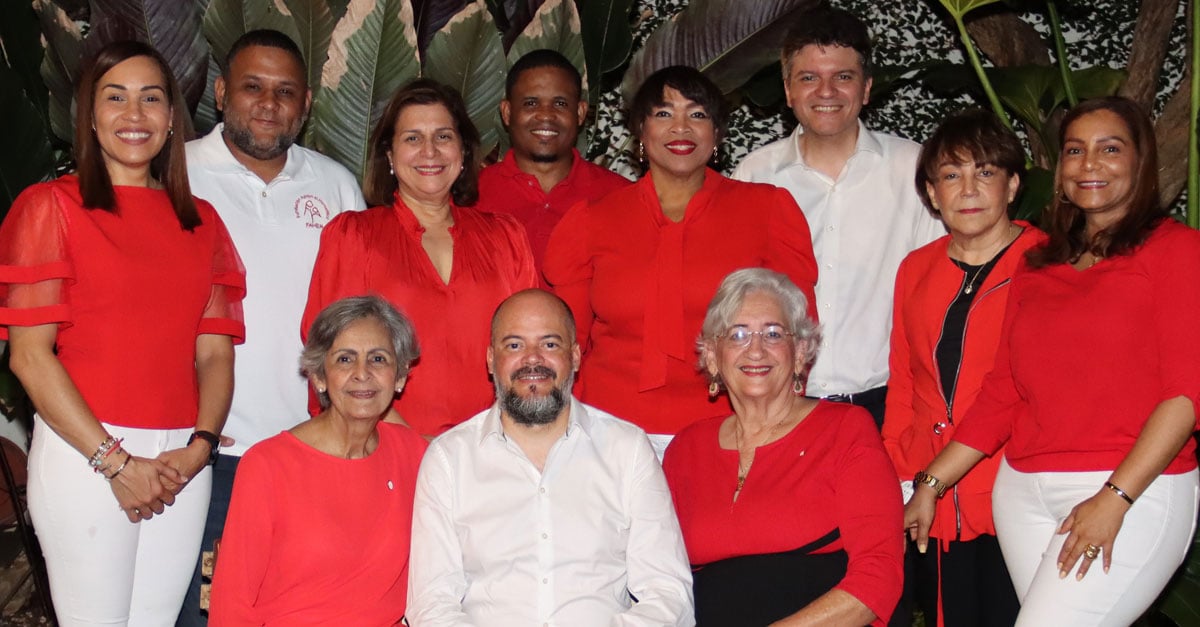
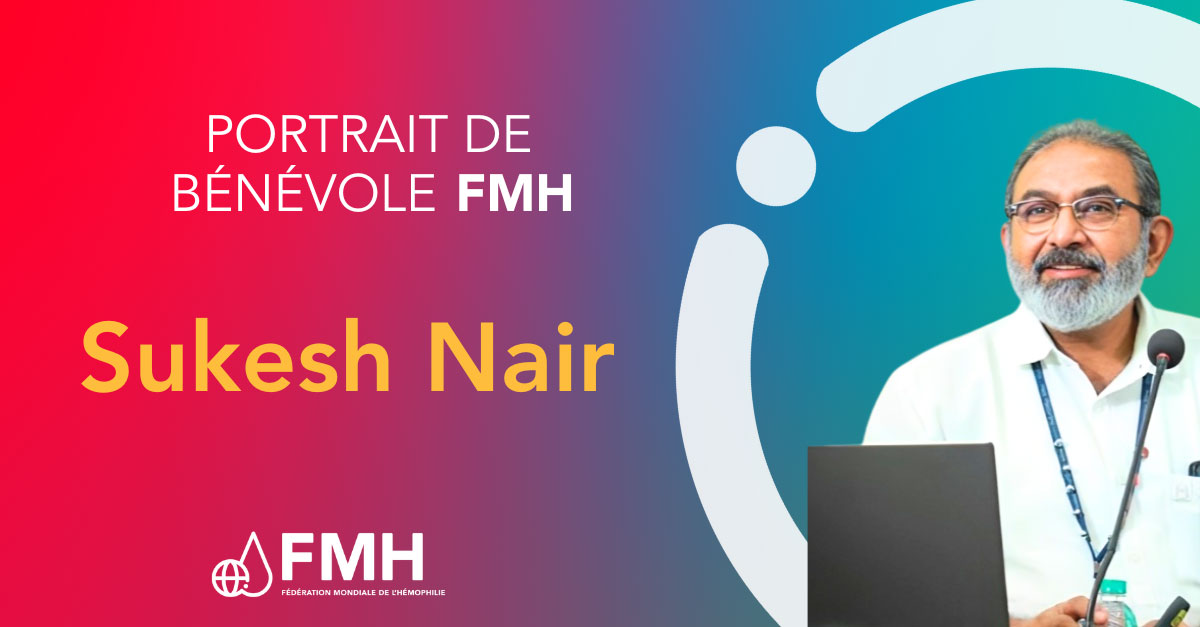
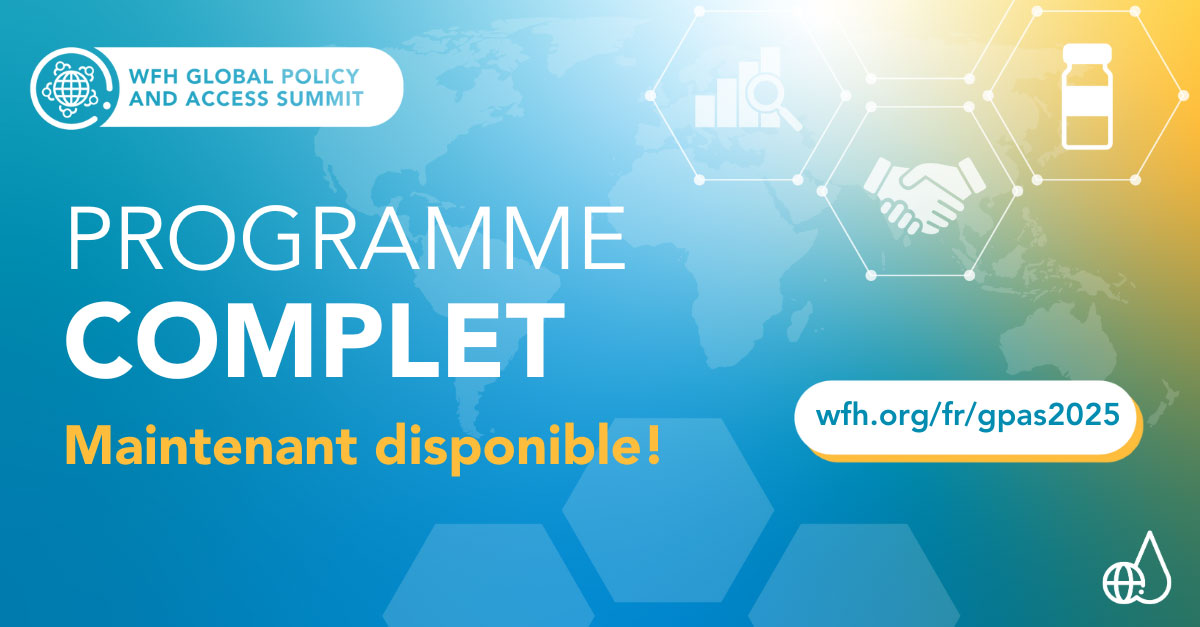
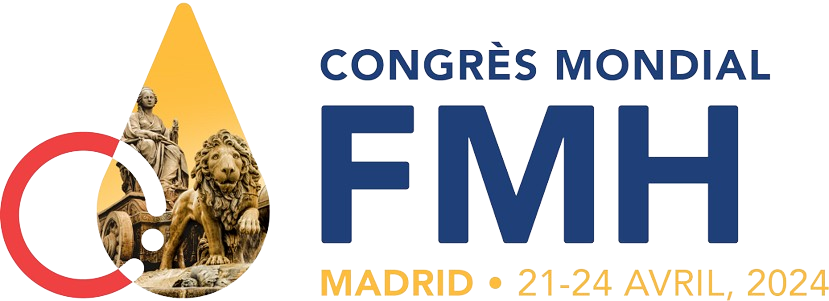





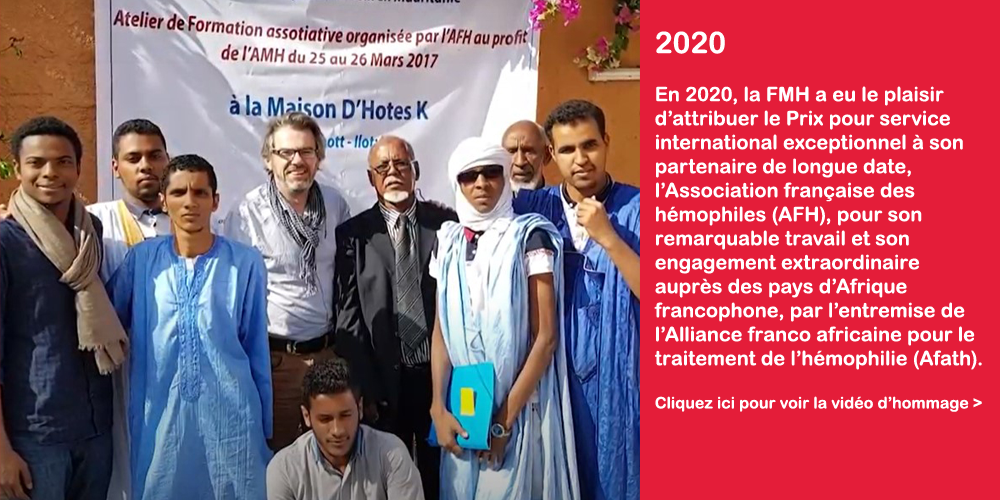
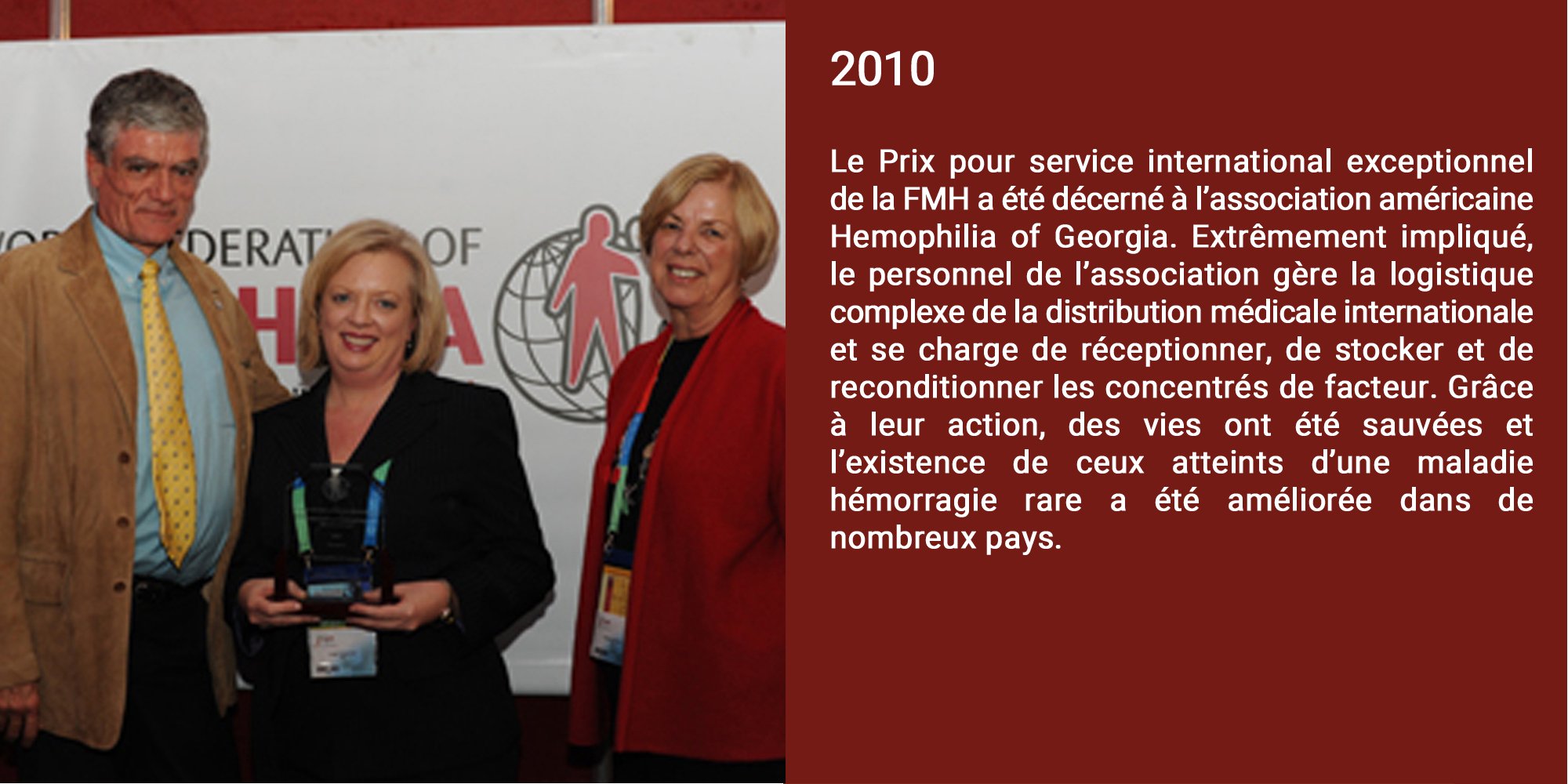
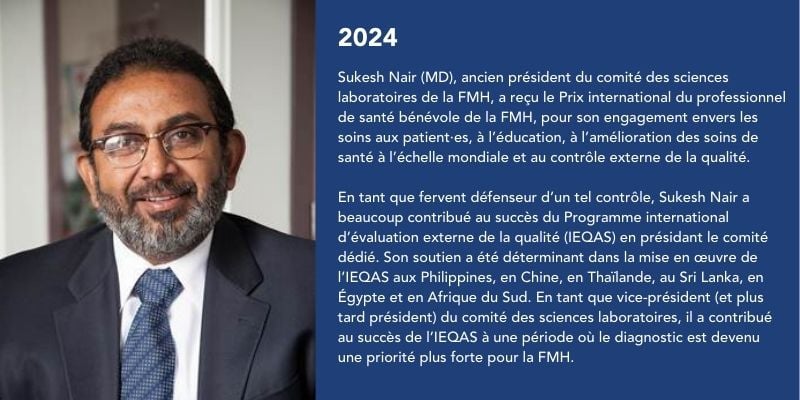
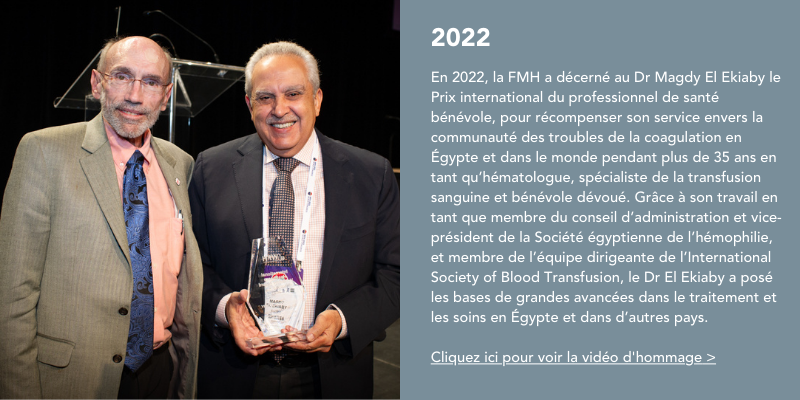
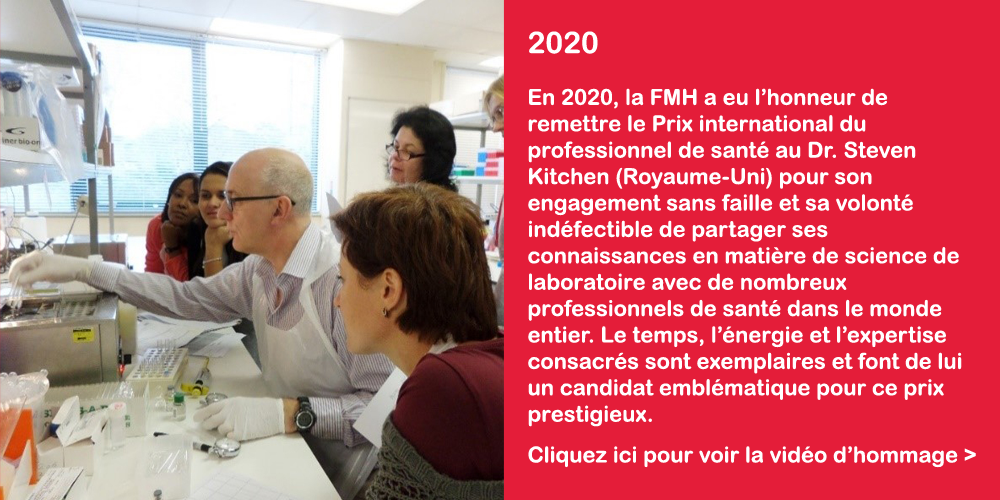
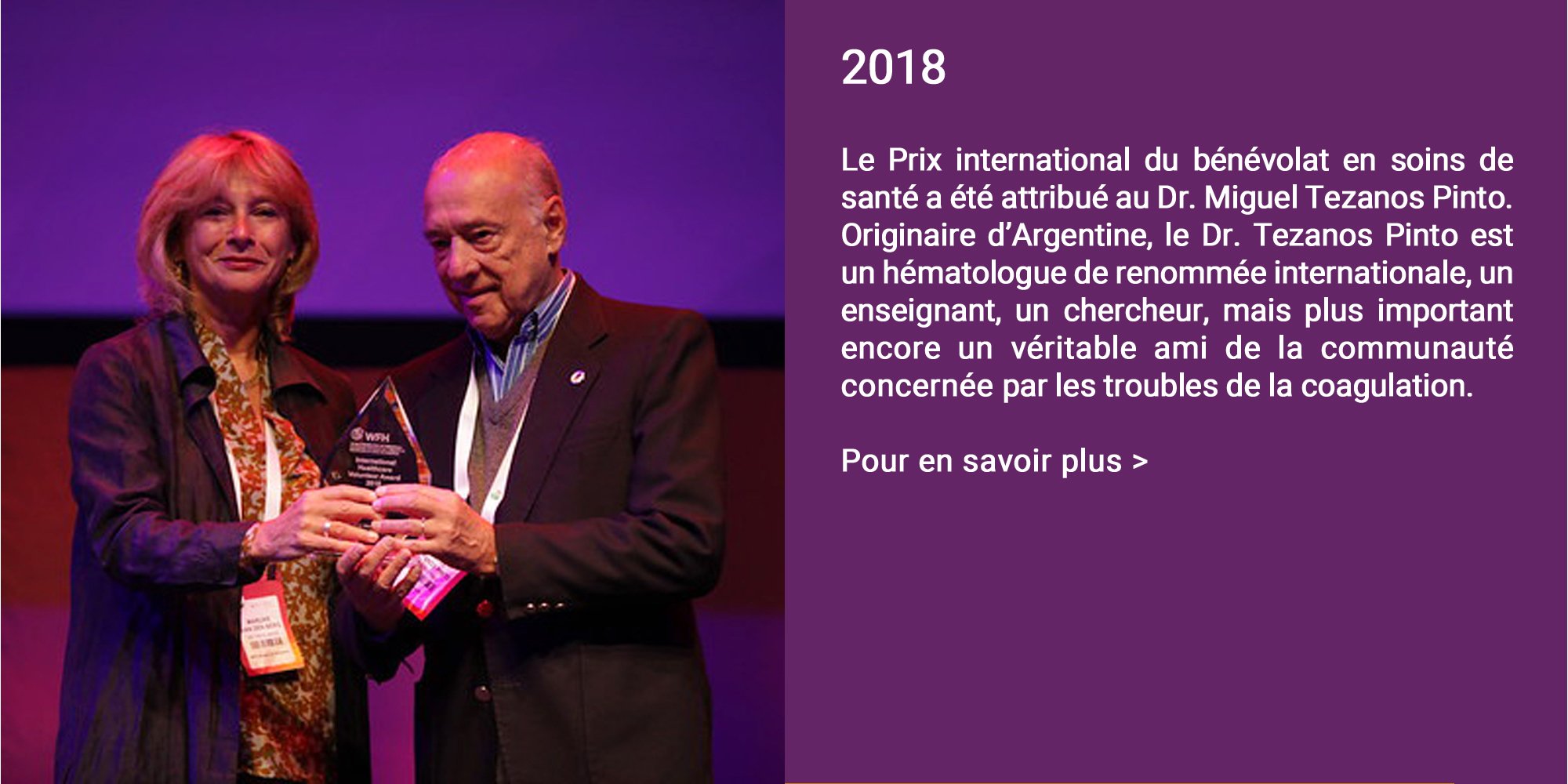
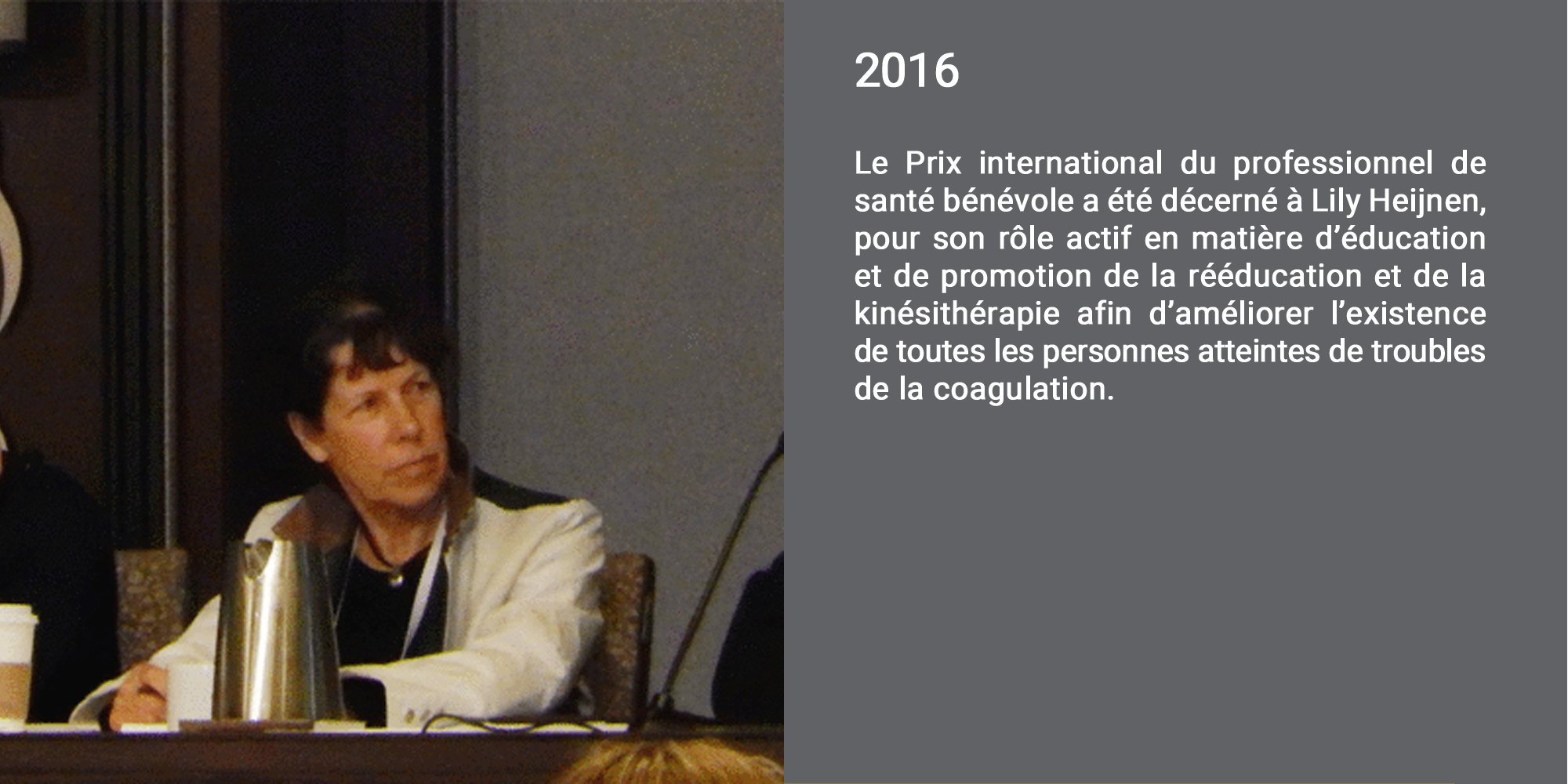
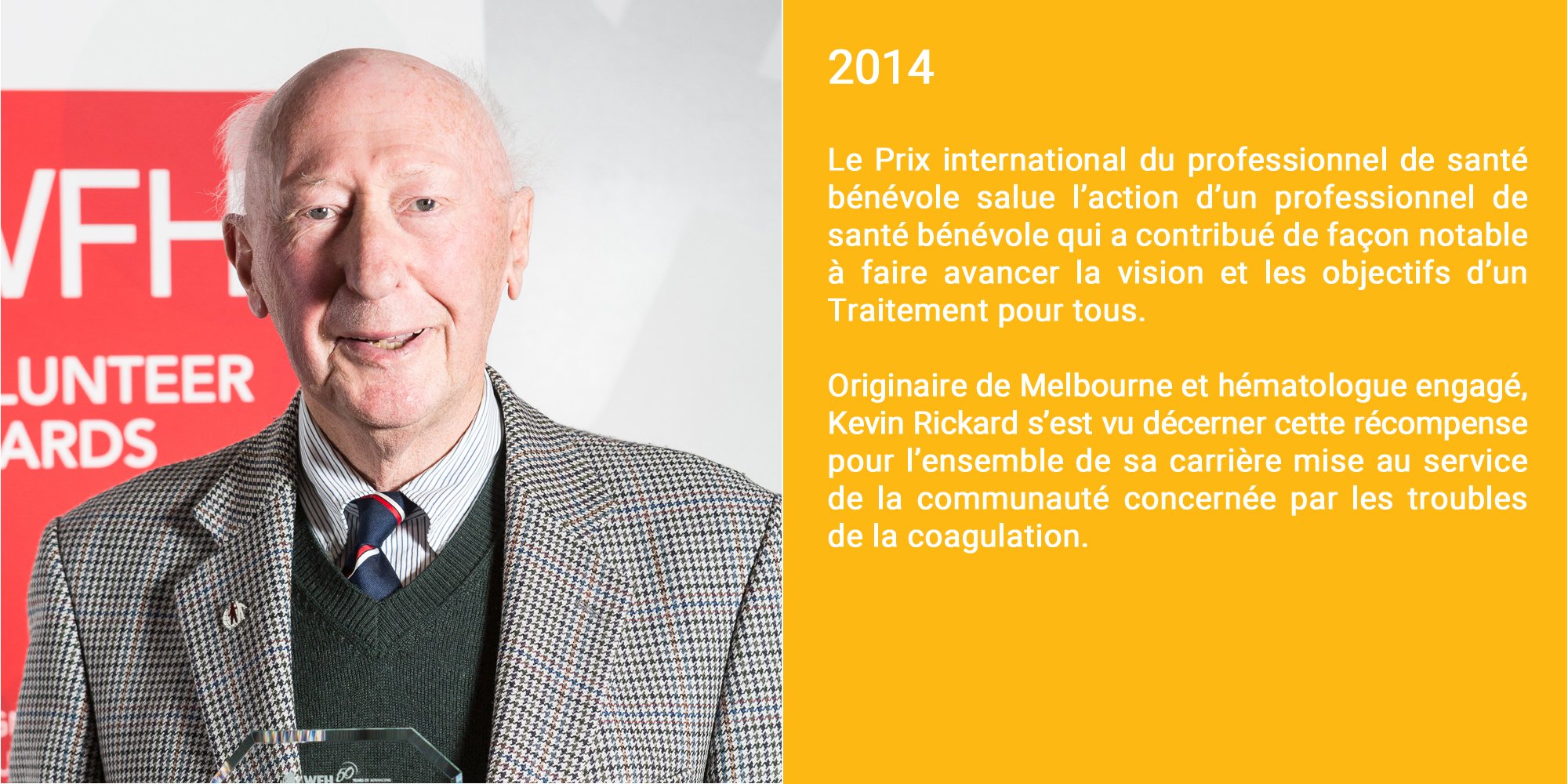
PLATEFORME D’APPRENTISSAGE EN LIGNE
L’endroit où vous trouverez tout ce dont vous avez besoin en lien avec l’hémophilie et les autres troubles héréditaires de la coagulation.
SONDAGE MONDIAL ANNUEL
Découvrez dès maintenant des graphiques interactifs qui vous permettront de visualiser les données démographiques et thérapeutiques relatives aux personnes atteintes de troubles de la coagulation, ainsi que les rapports du Sondage mondial annuel !